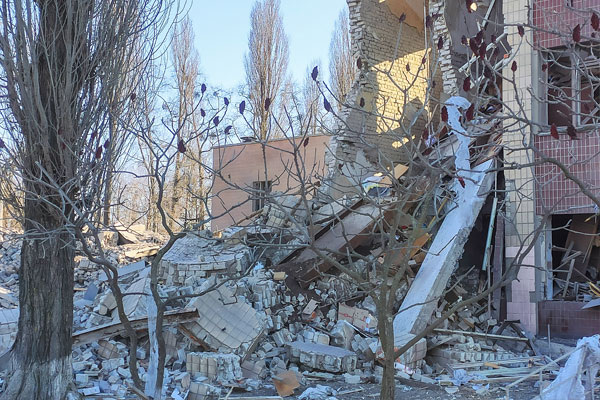How you can support academics at risk this Refugee Week and beyond
Recent daily news bulletins have made us all too familiar with the names of Ukrainian cities that are now under violent attack – not just Kyiv, but important regional centres like Kharkiv, Sumy, Chernihiv, Sieverodonetsk and Mariupol. All have universities and research institutes – most have several – where thousands of academics were engaged in teaching and research. Sadly, many of these institutions have been targeted over the last four months, with devastating consequences. Some, as in Mariupol, have been completely destroyed. Even where the buildings are still standing, their academic communities have been dispersed. Most of the men and many women are helping to defend their country, while others, very often the women who have children or older relatives to care for, have embarked on difficult journeys westwards, to the relative safety of cities like Lviv or across the border, to Poland and beyond.

School hit by rocket in Kharkiv, Ukraine.
Among those leaving are many who are looking not only for safety, but also for a place to continue their academic work until they can return home. Many have got in touch with Cara, a UK charity founded in 1933 by William Beveridge and other leading academics of the day as a rescue mission for their colleagues who were being forced out by the Nazis. The founders’ goal was “the relief of suffering and the defence of learning and science”. Almost 90 years on, that is still Cara’s guideline today.
Ukrainian academics may be the latest group to need our help, but they are by no means the only people whose lives and dreams are being turned upside down by persecution, violence and conflict, and who need to escape. Since Kabul fell to the Taliban last August, over 750 Afghan academics have turned to us for help to escape from the new regime, fearing retribution for their past links with western universities and academic colleagues. Many of their worst fears have since been realised, under a ‘Minister for Higher Education’ who publicly questions the value of academic qualifications, blames academics for importing blasphemy into Afghanistan, and warns that those who step out of line in future will not see the sun rise the next day. Female academics must live under ever-tightening rules about their dress and behaviour, in a country where higher education is now strictly segregated by gender and where the whole future of women’s education is under threat, with secondary schools for girls still closed.
But while Ukraine and Afghanistan have been in the headlines in recent months, there are many other people who also need help, fleeing situations that are now reported in the media less frequently but no less dangerous for them. In recent years, we have helped hundreds to escape from the bitter civil wars in Yemen and Syria; from the violence of other despotic regimes and extremists around the world; and from individual persecution on grounds of religion, ethnicity, sexual orientation or gender identity.
The present-day version of our founders’ original rescue mission is our Fellowship Programme, through which 130 UK universities and research institutes in our support network offer places and funding for those needing sanctuary. Other organisations, such as the Microbiology Society, offer valuable additional support in their specialised fields. Over 100 ‘Cara Fellows’, many with their families, are currently being hosted here in the UK, sharing their own experience and developing new skills that they will be able to take back with them, when the moment comes. Others are in placements or have moved into academic roles outside the UK, for example in Germany, France, Canada, Australia, Malaysia, India and Pakistan. At any given time, we are also working with another 80–100 successful applicants to help them to identify a suitable host institution, or to sort out their often complex travel and arrival arrangements, while other team members are reviewing the new applications – often 20 or more each week. Currently, there are over 350 ‘Cara Fellows’ in all, with some 500 family members.
It is detailed and painstaking work and needs to be done as quickly as possible. We recently recruited two extra staff members and are now recruiting two more, just to be able to cope. We are also closely involved with a new Government-funded initiative, led by the British Academy, to help researchers fleeing the crisis in Ukraine, and are running our third regional programme to help academics in exile near their own countries or working on at home, despite the risks. Launched in 2016, our Syria Programme is now working with some 200 Syrian academics, most of whom are in Turkey, with the support of over 400 academic volunteers from a wide range of UK universities.
And all this with a team of just 18.
If you would like to help, please visit Cara’s website. If you are connected with a UK university or research institute, a drop-down list of all our ‘contact points’ at partner institutions is available on our website, and the person listed should be able to help you find out more about what your institution is doing. Cara also has to raise the funds it needs for its work each year and, while many universities and foundations are generous supporters, individual donations also play a very important role in our work.
Cara is a registered charity, No 207471.
Stephen Wordsworth
Executive Director, Cara
[email protected]
Image: Council for At-Risk Academics (Cara)
